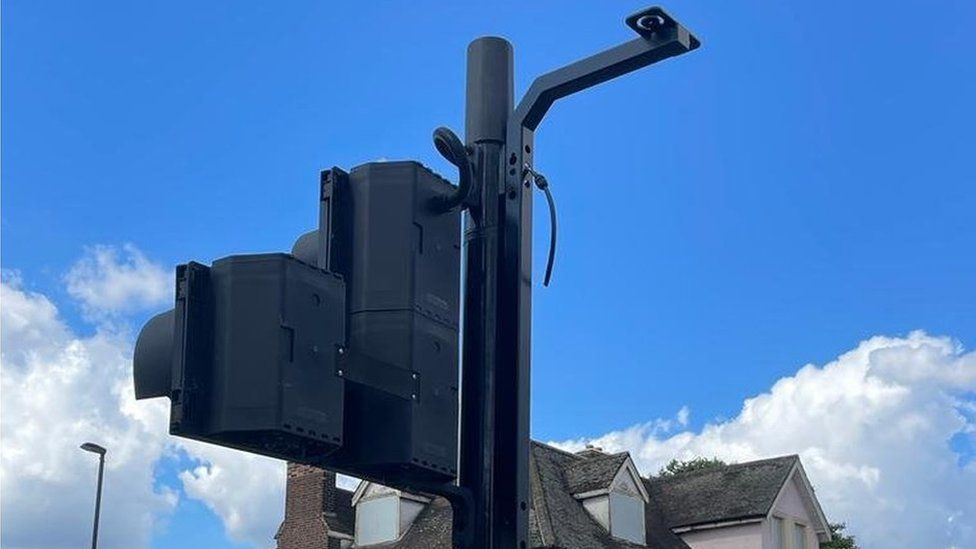21 minutes ago
About sharing
More than 300 cameras installed for London’s Ultra Low Emission Zone (Ulez) were vandalised or stolen between April and mid-August, the BBC can reveal.
Over four months, the Met received 339 reports of camera cables being damaged, or cameras being stolen or obscured.
The actual number of cameras affected is likely to be even higher as one report can represent multiple cameras.
Unofficial data mapping the location of disabled cameras suggests that almost 500 cameras could have been affected.
It also suggests that the vast majority have been in outer London where the zone is being expanded.
Some 1,900 cameras have been installed in outer London so far.
Despite so much damage being caused, one man has so far been charged by police.
Scotland Yard has now released an image of a man detectives are trying to trace in connection with four offences in Hillingdon, Harrow and Uxbridge on 17 June.
Det Supt Daniel Smith, the detective leading the operation targeting those disabling cameras, said the Met was “proactively targeting those who we suspect of causing damage”, and called the vandalism “unacceptable”.
The force has not revealed the locations of any of the disabled cameras, but Chris Brown, a Greenwich resident who is opposed to the Ulez expansion, has been using third-party reports to track the locations and damage caused to cameras.
The map shows there are 1,619 cameras outside the North and South circular roads with 461 of those reported as vandalised or stolen – equating to 28% of the Transport for London’s (TfL) network cameras.
TfL is planning to install a total of 2,750 cameras before the expansion comes into force at the end of August.
Speaking at Mayor’s Question Time on 20 July, Sadiq Khan said transport bosses were confident “there will be the same number of cameras up on 29 August that they had originally planned” and that “there is no need for Plan Bs, Cs or anything else”.
The BBC visited one area in south-east London where seven cameras had recently been damaged. Residents there had mixed views.
Abbie Mires, who works in the area, said the “harsh action” of targeting Ulez cameras was justified.
“It is criminal, but at the end of the day people are trying to prove a point and no one is listening. Old people who’ve been using their cars for years and years now have to stop driving because they can’t afford it,” she said.
Other residents like Sam Lockwood said damaging Ulez cameras was a “step too far”.
“Maybe they think they are Robin Hood characters trying to help others and if they want to risk it that’s fair enough. But I think there are better ways to fight the system,” he said.
Husband and wife, Roy and Linda McKensie had to get rid of two cars ahead of the Ulez expansion, but said they did not agree with cameras being tampered with.
“It’s criminal activity whichever way you look at it. And I don’t agree with that,” said Roy.
His wife Linda added: “I know things are awkward. I know things are frustrating. But if it all ends up getting lawless it’s not going to work.”
A spokesperson for TfL said: “Criminal damage to the cameras puts the perpetrators at risk of prosecution and life-changing injuries, while simultaneously risking the safety of the public.”
When the BBC asked TfL and the mayor’s office about the costs of vandalism it was told that “due to commercial and confidentiality reasons, it cannot share the unit cost of cameras, or for repair of cameras”.
The only figure the BBC has seen was an estimate cost of the planned expansion from November 2022, which was about £159.5m based on assumptions at that time.
This includes spend for systems design, development and testing; on-street infrastructure design, procurement and delivery including camera installation and signage; marketing and media campaign; and legal and consultation costs.
Follow BBC London on Facebook, Twitter and Instagram. Send your story ideas to hellobbclondon@bbc.co.uk
Related Topics
2 days ago
26 July
3 August
